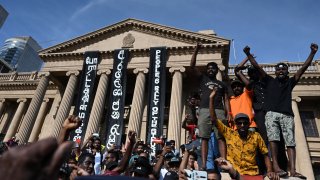
- The International Monetary Fund has preliminarily agreed to extend a 48-month $2.9 billion loan to Sri Lanka to help restore economic stability to the crisis-hit South Asian country.
- The loan will be made under the IMF's Extended Fund Facility, which helps countries deal with balance of payments or cash flow problems.
- "Sri Lanka has been facing an acute crisis. Vulnerabilities have grown owing to inadequate external buffers and an unsustainable public debt dynamic," the IMF said in a statement.
The International Monetary Fund has preliminarily agreed to extend a 48-month $2.9 billion loan to Sri Lanka to help restore economic stability to the crisis-hit South Asian country.
The loan will be made under the IMF's Extended Fund Facility, which helps countries deal with balance of payments or cash flow problems. It will only be disbursed after satisfactory debt restructuring, including debt relief arrangements have been struck between Sri Lankan authorities and the country's creditors.
Get Connecticut local news, weather forecasts and entertainment stories to your inbox. Sign up for NBC Connecticut newsletters.
Other reforms in the program — the 17th for Sri Lanka — include the reduction of corruption and an increase in financial transparency.
"Sri Lanka has been facing an acute crisis. Vulnerabilities have grown owing to inadequate external buffers and an unsustainable public debt dynamic," the IMF's Peter Breuer and Masahiro Nozak, who led a mission to Sri Lanka in the past week, said in a press release.
"The April debt moratorium led to Sri Lanka defaulting on its external obligations, and a critically low level of foreign reserves has hampered the import of essential goods, including fuel, further impeding economic activity."
Money Report
The IMF said Sri Lanka's economy is expected to contract by 8.7% this year as inflation soars above 60%.
"The impact has been disproportionately borne by the poor and vulnerable," the IMF's Breuer and Nozak said, adding the funds "aim to stabilize the economy, protect the livelihoods of the Sri Lankan people, and prepare the ground for economic recovery and promoting sustainable and inclusive growth."
The IMF said the new loan is subject to approval by IMF management and the executive board. It also said the loan cannot be made unless Sri Lankan authorities have conducted satisfactory debt restructuring including debt relief arrangements with external creditors.
It is therefore contingent on the IMF receiving financing assurances from Sri Lanka's official creditors that deals have been reached and Sri Lanka is able to repay its debts. The IMF must also be satisfied that local authorities have made good faith efforts to reach a collaborative agreement with all other private creditors.
Sri Lanka has more than $50 billion in external debt owed to countries such as Japan and China as well as the World Bank, according to the Sri Lanka central bank.
At a press conference Thursday, Breuer said the preliminary agreement is a signal from the Sri Lankan authorities they were committed to comprehensive reforms that would be monitored by the IMF.
"This is a credible device to show creditors that Sri Lanka is serious in engaging in reforms," Breuer said.
"It is assuring creditors that it will restore payment capacity and is committed to do so, to the international committee."
Breuer urged creditors to collaborate with Sri Lanka on negotiations as delays in discussions can stall the disbursement of IMF funds and deepen the crisis on the island nation.
He also told CNBC that loans relating to China's Belt and Road Initiative would be restructured as part of Sri Lanka's overall debt negotiations.
If approved by the IMF, the first lot funds will be released at the time of approval with subsequent disbursements made over IMF's EEF program periods, Nozak said. A review will precede each set of payments.
The loan program also includes helping Sri Lanka raise fiscal revenue and implement major tax reforms, including more progressive taxation and broader corporate and VAT taxes.
It aims to help the Sri Lankan government reach a fiscal surplus of 2.3% of GDP by 2024. It has a projected 2022 deficit of 9.8% of GDP.
Nozak said Sri Lanka's tax collection was very low but new taxes that are collected must come from high-income earners so the poor and vulnerable would not be impacted.
The IMF will also help the country — where inflation hit 64.3% last month — restore price stability through data-driven monetary policy action as well as stronger autonomy for the central bank. This would require a new Central Bank Act, the IMF said.
"Central bank independence is indeed very important. It is important to reduce and eliminate monetary financing — meaning the financing of the government by printing money — which fuels inflation, which in turn is a high tax on everyone in the country," Breuer told CNBC.
He added that successful implementation of the reforms could create a "catalytic effect" where private flows including investments would flow back into Sri Lanka helping it rebuild its reserves.






